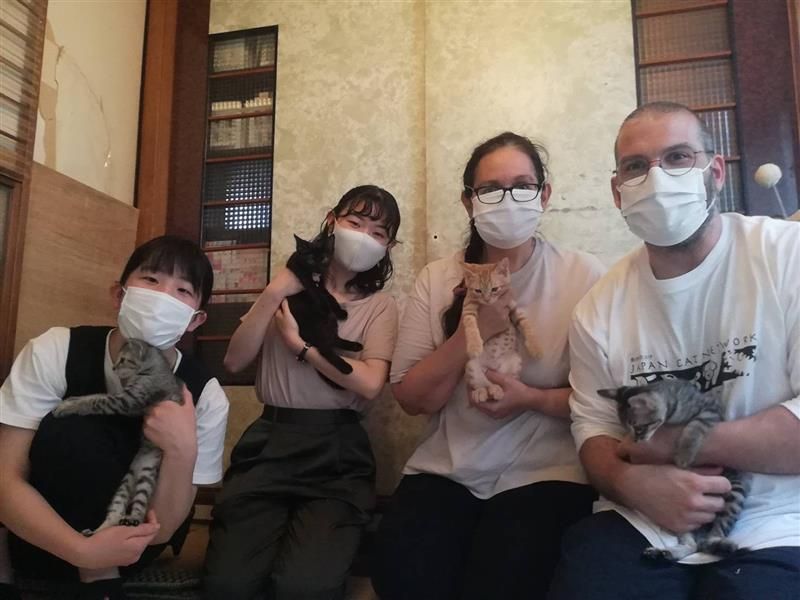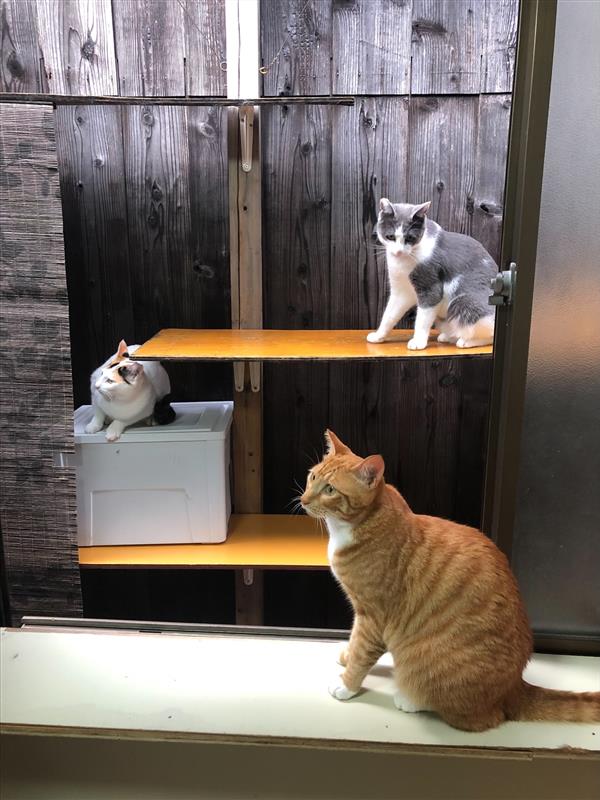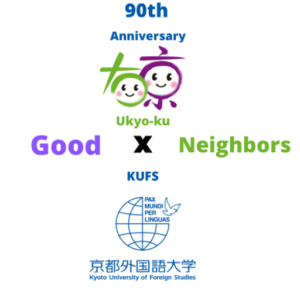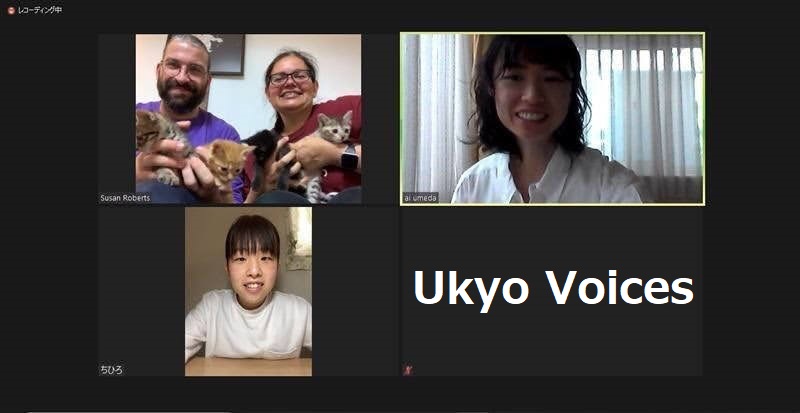[Ukyo in Action] Japan Cat Network (NPO)
Interviewers/Authors: Ai Umeda, Chihiro Okajima
Ms. Susan Roberts (Co-founder)
Mr. Luis Raimundo (Manager/Volunteer program coordinator)
The Japan Cat Network (hereinafter referred to as JCN) was co-founded in 2000 in Shiga Prefecture by Susan Roberts, an American woman, to help stray cats. The organization went on to create a base in Fukushima, following the 2011 earthquake and tsunami, and now JCN has programs in Tokyo and Kyoto, helping with cat issues throughout Japan. The JCN Kyoto program is based in a Machiya style house in Ukyo-ku, Kyoto, and has an office, accommodation for volunteer members and a cat rescue house. We interviewed Susan and Luis, one of the main volunteers, about their work with the JCN.
― How long have you been involved with the JCN?
Susan: For me, it’s been 20 years.
Luis: I started volunteering in May 2020 and have been working as a manager since July.
― What do you do on a daily basis at the JCN?
Susan: As a foster and adoption parent coordinator, my main job is to interview prospective parents and determine if they are suitable for the foster or adoption of cats. In addition to taking care of the cats, I also answer emailed questions about stray cats and other cat related issues every day.
Luis: As a volunteer program coordinator, I’m responsible for training volunteer staff and managing the schedules. In addition, I manage cat health and the rescue houses.

― What is the most important thing a person should know or understand when volunteering at the JCN?
Susan & Luis: The JCN recruits volunteers to take care of the cats, and we will let them know what to do. Therefore, volunteers really don’t have to know anything much beforehand. However, it is very important they understand and learn how to take care of animals, and have a true desire to help them.
― What has been the most difficult thing you have had to deal with while you have been at the JCN?
Susan: When the Great East Japan Earthquake happened, in 2011, it was impossible for the victims and their pets to live together because they could not accept animals at evacuation centers. It was very sad to have to take pets away from their owners. There have been other difficult situations as well. For example, we were once contacted about a cat trapped in a locked car, and a frantic call to the police was made.
― What do you find most rewarding about being involved in the JCN?
Susan: Everything I do is rewarding, but one of the things I was very glad about was a video of the JCN’s activities was included in a published junior high school English textbook called “New Horizons.” This was an important message, and I hope this will help spread awareness of the plight of stray cats.
Luis: When I look at the messages, the pictures and videos of the cats that the foster parents send me, I can see how they are being loved, and this is very rewarding.

― What is the philosophy of the JCN?
Susan: “Helping people help pets.” In order to change the current situation in various regions, we need to change people’s attitudes and behavior and help them as much as possible. For example, I answer questions from people on a daily basis about how best to care for their cats. By doing this, I believe we can begin to help stray cats more and more.
― Why do you think organisations like yours exist? What can we do to eliminate the need for organizations like the JCN?
Susan: The fact that there are animal protection groups like the JCN is because there are obviously problems to be solved in this area. Of course, the main solution is to take measures to reduce the number of stray cats. That’s why it’s important to give advice to people on how to take care of cats and other animals.
― What role do you think the JCN play in Ukyo Ward and for the people living in Ukyo Ward?
Susan: One of the roles of the JCN in Ukyo Ward is to decrease the number of stray cats. This can be accomplished by increasing the number of cats that undergo contraceptive corrective surgery. When we find a stray cat, we trap it with a humane trap designed not to harm the cat and take it to the hospital for surgery. After the operation, if the cat is fine, we will return it to the original place. It is very important for cats to have contraceptive correction surgery, because if there are too many cats living on the streets, they can’t eat or drink enough, and kittens in particular have difficulty surviving. Therefore, in order to avoid an increase in the number of poor stray cats, it is extremely important to have contraceptive correction surgery performed on the stray cats.
― How do you think the two of you and the JCN will play a greater role in the local community in the future?
Susan: As the main role of the JCN is to act as a bridge between cats and their foster parents, we would like to create a ‘cat café’ as a place to give people in Ukyo Ward the opportunity to meet our cats.


